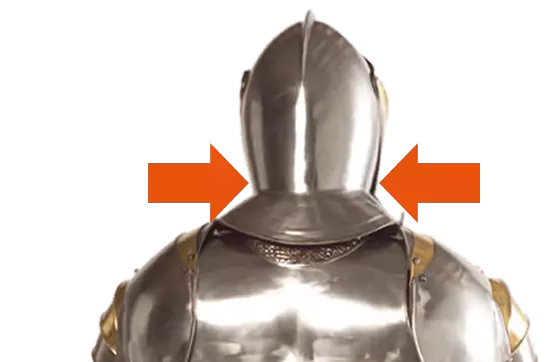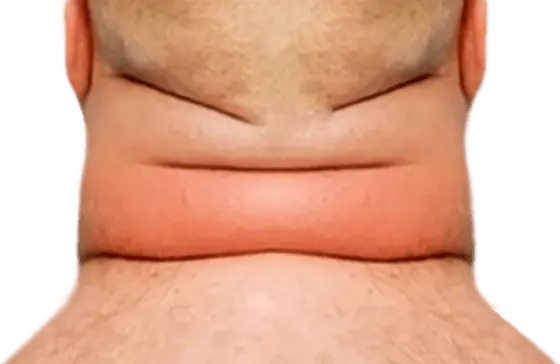Contraindications for Atlas Correction

Absolute Contraindications for Atlas Correction
- SEVERE degenerative alterations of the cervical spine, (uncovertebral arthrosis, osteophytosis, or fusion between adjacent vertebral bodies).
- Epicondylar exostoses or bony deformities of the occipital condyles.
- Arnold-Chiari Malformation characterized by the descent of the cerebellar tonsils through the foramen magnum into the spinal canal. Our observations suggest that this syndrome may at least be aggravated by cervical straightening, as the two conditions often occur together. Cases with Arnold-Chiari malformation type 1 (the least severe form) may be treated, provided the underlying cervical spine straightening is addressed and resolved (click the link).
- Hydrocephalus treated with cerebrospinal fluid shunt (the shunt runs under the neck skin).
- Stroke occurring within the last 9 months.
- Acute or chronic very SEVERE inflammatory diseases, as well as severe infections.
- Diseases causing physical wasting or cachexia, such as tuberculosis and similar conditions, as well as cancer, particularly if accompanied by osteolytic or osteoblastic metastases.
- Retinal detachment or recent cataract surgery.
- SEVERE arteriosclerosis
- Cerebral aneurysm
Relative Contraindications for Atlas Correction
- Instability of cervical ligaments, particularly if an accident or trauma caused a lesion of the joint capsule, ligaments of the Atlas, or Axis (Atlanto-Occipital and Atlanto-Axial instability). Ligamentous laxity represents a relative contraindication: the Atlas correction can be performed with the necessary precautions, but the results may not be long-lasting.
- SEVERE malformations of the Atlas, affecting the posterior arch or transverse processes, which may be incomplete or missing, or malformations of the occipito-cervical junction.
- Subcutaneous implants: implants and hearing aids, cardiac pacemakers, vagus nerve stimulators (VNS).
- Whiplash occurring less than 2 months ago.
- VERY poor general health conditions: lacking the resources needed for the regeneration phase.
- Use of oral anticoagulant medications, such as NOAC or dicoumarol (e.g., Coumadin and Sintrom, excluding aspirin): these drugs are used for long-term prevention of embolisms in conditions like cardiac arrhythmias, including atrial fibrillation, valvulopathies, mechanical valve implants, dilated cardiomyopathy, or previous deep vein thrombosis.
- In the case of pregnancy, Atlas correction should only be performed if the mother has severe symptoms due to Atlas misalignment, making her dependent on medications. In other cases, it is recommended to postpone correction until after childbirth, following the precautionary principle.
For relative contraindications, do not hesitate to contact an AtlantoMed specialist to evaluate a possible individual solution.
Special cases and exceptions
There are situations where Atlas realignment can be particularly challenging, requiring an adaptation of the standard treatment procedure. Some examples include:
Extreme Cervical Contracture

- If the neck muscles are excessively tense, it is necessary to carry out 1 or 2 intensive massage sessions (preparatory session) using the dedicated AtlantoVib device, which induces deep muscle relaxation and provides significant benefits. Once the neck muscles are sufficiently relaxed, the Atlas misalignment correction can proceed.
Excess Adipose Tissue

- In cases of excess adipose tissue or extremely developed cervical muscles resulting from intensive sports activities, the treatment becomes particularly challenging, especially due to the difficulty of accurately determining the Atlas position.
Severe Depression

- In cases of severe depression, especially when associated with prolonged use of psychotropic drugs or deeply negative emotional states, the treatment is not recommended. After Atlas realignment, the body needs adequate resources to regenerate and eliminate postural compensations adopted to counterbalance the misalignment.
Individuals suffering from depression may lack the necessary resources for regeneration, leading to prolonged negative reactions after treatment before experiencing potential improvements. However, if the depression is solely a consequence of chronic pain, such as that caused by the aftermath of a cervical whiplash or frequent migraine attacks, the AtlantoMed treatment can represent an effective solution, providing significant benefits.
Surgical Cases and Fractures
Surgical procedures such as intervertebral disc replacements, discectomy, arthrodesis, or laminectomy are not contraindications for the treatment, provided the surgery has fully healed.
Fixation of vertebrae with plates or rods does not preclude Atlas correction. However, radiological exams are necessary to precisely identify the placement of plates and screws to avoid applying direct pressure on them during the massage and to assess the state of cervical spine degeneration.
In addition to correcting the first vertebra, we have observed that treating the operated area with the AtlantoVib device can provide significant benefits. Vibro-resonance works deeply, softening the hardening often formed after surgery, improving scar flexibility, enhancing vascularization, and increasing the mobility of vertebral segments not involved in fixation.
It is recommended to precede the Atlas correction session with a preparatory session.
People who have undergone such surgeries often encounter resistance from manual therapists due to unfounded fears of causing damage.
Cases of vertebral fractures, including those of the Atlas, can be successfully treated with AtlantoMed once the complete healing of the fracture has been confirmed by tomography and following prior medical consultation.
The fusion or fixation of C0, C1, and C2 obviously prevents the correction of these vertebrae. It is desirable that the vertebrae were fixed in alignment. Even if a correction is not possible, the surrounding musculature can still benefit from relaxation through an AtlantoVib massage session.
If you have any doubts or questions, do not hesitate to contact an AtlantoMed specialist to explore a tailored solution.
What People Say About Us
Beware of those who disguise a simple cervical manipulation as Atlas realignment and those who offer low-quality imitations of our method. The results speak for themselves: over 10,000 testimonials and reviews in various languages make us unique. Click to discover opinions, ratings, and authentic experiences shared by those who have experienced Atlas correction with Vibro-Resonance AtlantoMed:



